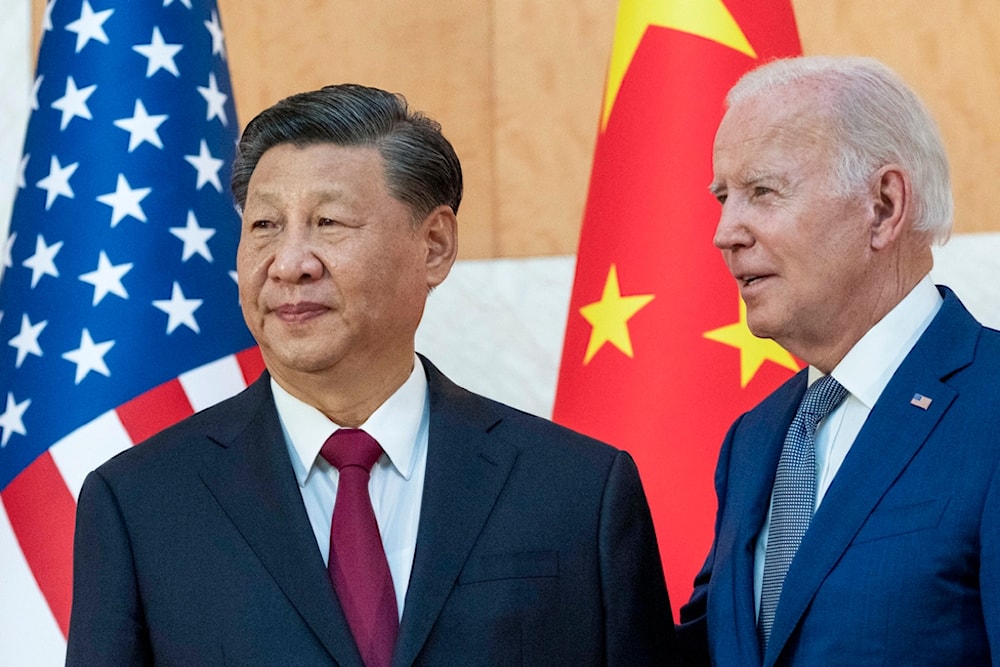Chip War: US to press ASML, Netherlands, against chip exports to China
The US export policy chief is scheduled to meet with Dutch and ASML representatives to persuade them against supplying China with microchips.
-

President Joe Biden, right, stands with Chinese President Xi Jinping before a meeting on the sidelines of the G20 summit meeting, Nov. 14, 2022 (AP)
Expediting the tech war against China, the Biden administration intends to press the Netherlands against supplying China with microchips manufactured by Dutch chipmaking equipment maker ASML.
The United States export policy chief, Alan Estevez, is expected to arrive in the Netherlands on Monday for talks with the Dutch government officials and representatives from ASML, to persuade them against extending technical services to China, Reuters reported.
Washington might also sanction certain Chinese manufacturers to prevent ASML exports, informed sources on the talks between the US and the Netherlands relayed.
The Dutch government, which has not dismissed the possibility of withholding licenses to service ASML equipment in China under certain circumstances, did not provide any comments when asked on Thursday. The Foreign Ministry stated that it evaluates licensing requests individually.
However, briefly after the meeting, ASML's shared witnessed a decline in value.
Chinese President Xi Jinping addressed the United States' actions and told Joe Biden that such decisions jeopardize China's development.
It is worth noting that although the US imposed dense sanctions against China to hinder its technological advancement, the latter was still able to revolutionize the tech world by introducing the Huawei microchip-powered Pro Mate 60.
Imposed tech barriers to be confronted
Last week, Xi Jinping warned against actions that would break industrial supply chains and create inter-continental technological barriers, in light of new Dutch policies entailing chip exports that could sever bilateral ties between both nations.
In a meeting with Dutch Prime Minister Mark Rutte, President Jinping said tech barriers and the severing of industrial supply chains would only lead to confrontations and divisions, adding that cooperation is the only path to follow.
"The Chinese people also have the legitimate right to development, and no force can stop China's scientific and technological development and progress."
Rutte's discussions in Beijing were anticipated to revolve around whether ASML would be granted Dutch government licenses to continue servicing advanced equipment worth billions of euros that it has previously sold to Chinese clients. These machines are now subject to export restrictions, with many licenses set to expire, notably by December 31.
Although the export limitations have thus far minimally affected ASML's financial performance, the company holds a dominant position in the global market for lithography systems, essential tools in chip circuitry production.
However, in the longer run, if the Netherlands is perceived as an unreliable business partner, Chinese chip manufacturers may opt to replace ASML's equipment with that of competitors such as Nikon and Canon.
Dutch Trade Minister Geoffrey van Leeuwen also attended the meeting and told Dutch business daily FD that he is only concerned with his country's interests as his main priority.
His comments highlight the delicate diplomatic strain the Dutch government faces, especially with ASML becoming a focal point in the ongoing "chip war" between the United States and China.
According to state media, Xi informed Rutte that China was prepared to increase imports of "high-quality" goods from the Netherlands, although specific details were not provided. He also expressed China's readiness to maintain and advance an open, pragmatic cooperative relationship with the Netherlands.
Read more: China hits back on US chip war, restricts export of some rare elements

 3 Min Read
3 Min Read








